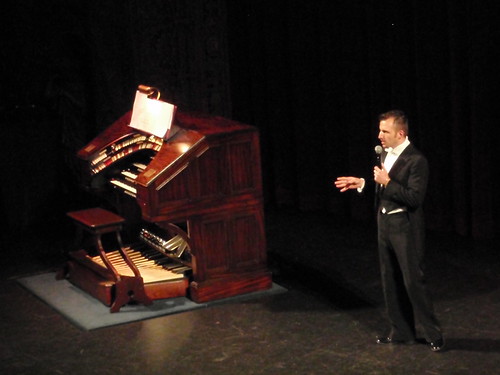
Today I went to the Tampa Theatre to see a one-time only showing of the newly restored 1927 movie Metropolis.
It's always great to see movies in this theater because inside it looks like this:

It was considered a "movie palace" when it was built in 1926 and may have shown Metropolis on its original American tour.
Here's the trailer:
The movie had only ever been shown in its original length in Europe, after which it was shortened for world distribution. The cut parts were thought lost forever, but they recently found 25 extra minutes and what we saw was the result of their incorporation.
The Tampa Theatre is one of only twelve theaters in America to screen the movie. Our theater wasn't the first to screen it, but it was the first in North America to present the movie with the original score, played by organ, as it was originally shown in Europe.
I got there an hour and a half early and found a line:

The movie sold out. (1400 people can be seated in the theater.)
This is one of the people who made the show such a success:

He came from Michigan to play our Mighty Wurlitzer Organ, the 1920's version of surround-sound. He replaced an entire orchestra, even pushing buttons to control percussion instruments. Well, he almost replaced an entire orchestra. He did have to pound on the organ when someone on screen was pounding wood.
This is him at the organ's controls:

While the movie was playing the organ's controls retracted part-way into the stage and the organist watched the movie along with the audience, making sure the sound stayed in sync with the action on screen.
The organ is a powerful instrument, they said there are ten tons of it hidden in the walls. When you saw machines moving on screen, the organ would have a sound effect for them and you could feel the sound in your body, like you were right in front of the machines. All the sound effects were incorporated into an orchestral score, and it was amazing to hear one man perform everything so well.
The movie itself was good. It had strong political messages often presented in Christian terms that weren't offensive (I say that as an atheist) and also seemed pertinent to our times.
It's a sci-fi movie where poor workers and elite thinkers live in separate communities. They don't understand each other, even though they need each other to survive, because they never intermingle. Kind of like America today.
The heroine is a community organizer working out of a church. She tries getting the two sides together, telling them they are all brothers. She literally brings a group of poor children to the rich community and says "Look, these are your brothers!"
Some of the political messages are easy to spot, because they are shown in bold text on screen (with exclamation points). In the movie, the heroine is mainly talking to the poor. She doesn't want the workers to be violent because the elites are their brothers, and someone is sure to come along soon to bring them together. In reality, she's talking to the movie audience, both the workers and the thinkers.
"Look, these are your brothers!"
Something to remember in the heat of American politics, because we all need each other and attacking each other will only destroy us.
I will leave you with that thought, and some shots of the theater's decorative details:









